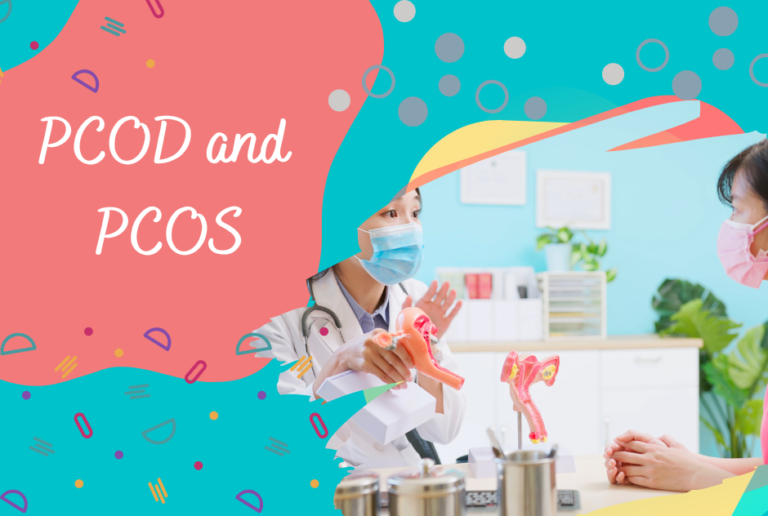What is PCOD/ PCOS | What causes PCOD | How to Deal With PCOD/ PCOS?

Introduction
We will talk about a topic which is very prevalent, that is PCOD (Polycystic Ovarian Disease) or PCOS (Polycystic Ovarian Syndrome), these words are many times used interchangeably. PCOD just means that you have polycystic ovaries on ultrasound but PCOS is the syndrome around it. That is, a club of problems such as weight gain, acne, male pattern growth (unwanted hair), irregular periods, bloatedness, mood swings, depression all these are caused by PCOS.






In later on life it too has some of the complications like diabetes, infertility and after a long time endometrial cancer can occur due to PCOS. But you need not to worry about it. This is a lifestyle disease. Now, our lifestyle is sedentary, this is why PCOS’s prevalence has increased. That every 1 girl out of 10 is suffering from PCOS, but at the same time this is a correctable problem and we can modify our lifestyle and revert it.
Effects of PCOD/ PCOS



It is not always sure that if you are suffering from PCOS, you’ll too suffer from diabetes and infertility. You can correct your lifestyle, so what you need to do is changing diet. Diet has a very important role in PCOS. You’ve to reduce, replace and refuse. This means avoiding sugars, avoid processed foods. The foods which take more time to cook too take more time to digest.
How to get rid of PCOD/ PCOS?

You have to consume fibers, salads, sprouts, vegetables, and food that provide enough fibers, vitamins, and nutrition to your body. These are good things which you should consume along with this you should consume more of brown rice and oats and above you should maintain a very healthy lifestyle. You should do at least 30 minutes a day exercise whatever suits you. Aerobics, dancing, walking or cardio whatever you want to do just do.
Second thing is that sleep time has a very important role. Minimum seven hours at night sleep and don’t use your phone or something when you are sleeping. With a mobile phone addiction, you know we sleep next to our mobile phones. That should not be done, we should try to maintain a nice and calm environment when we are going to sleep. Sleep nicely so your body will also get some time to repair and you know your stress levels will be a lot lower. That is very important for PCOS.

Other than that PCOS is something you need to consult your gynecologist for, because the treatment is individualized it is not the same for everyone. It also depends on your age, your symptoms and problems, or you are not able to conceive according to this, the doctor customizes your treatment. Whether you need contraception or you don’t want contraception. So consult your gynecologist and you’ll be just fine soon.


Conclusion
Polycystic Ovary Syndrome (PCOS) or Polycystic Ovarian Disorder (PCOD) is a common hormonal disorder that affects women worldwide. It presents a range of symptoms, including irregular periods, hormonal imbalances, acne, weight gain, and fertility issues. However, with early diagnosis and appropriate management, women can effectively deal with PCOD/PCOS and improve their quality of life. Lifestyle changes, such as maintaining a healthy diet, regular exercise, and stress reduction, play a pivotal role in managing the condition. Seeking medical advice and adhering to prescribed treatments, including hormonal therapy and medications, can help alleviate symptoms and promote hormonal balance. Empowering oneself with knowledge and adopting a proactive approach to managing PCOD/PCOS can lead to better outcomes, enabling women to navigate the challenges posed by this condition with confidence and live life to the fullest.
Frequently Asked Questions (FAQs)
PCOD (Polycystic Ovary Disorder) or PCOS (Polycystic Ovary Syndrome) is a hormonal disorder that affects the reproductive system in women. It is characterized by the formation of small cysts on the ovaries, hormonal imbalances, and a range of symptoms such as irregular menstrual cycles, excessive hair growth, acne, weight gain, and fertility issues.
Can PCOD/ PCOS be managed through lifestyle changes?
Yes, lifestyle changes can significantly help manage PCOD/ PCOS. Maintaining a balanced and nutritious diet, engaging in regular physical activity, and managing stress can positively impact hormonal balance and alleviate symptoms.
Is PCOD/ PCOS a curable condition?
While PCOD/PCOS is not entirely curable, it is manageable. Early diagnosis and appropriate treatments, along with lifestyle modifications, can effectively control symptoms and improve overall health.
Can PCOD/PCOS affect fertility, and what are the available treatments?
PCOD/PCOS can impact fertility due to irregular ovulation. Fertility treatments, such as ovulation-inducing medications, in vitro fertilization (IVF), and lifestyle changes, can enhance the chances of conceiving for women with PCOD/PCOS.
Is it essential to seek medical advice for PCOD/PCOS management?
Yes, it is crucial to consult a healthcare professional for a proper diagnosis and personalized treatment plan. A healthcare provider can assess individual symptoms, recommend appropriate tests, and provide guidance on managing the condition effectively.
Can weight management improve PCOD/PCOS symptoms?
Yes, maintaining a healthy weight through proper diet and exercise can significantly improve PCOD/ PCOS symptoms, as excess weight can exacerbate hormonal imbalances.
Are there any natural remedies or alternative therapies for PCOD/PCOS management?
Some natural remedies, such as herbal supplements and acupuncture, may provide symptom relief for some women. However, it is essential to consult with a healthcare professional before trying any alternative therapies to ensure their safety and effectiveness.
Disclaimer
Remember, every woman’s experience with PCOD/ PCOS is unique, and what works for one person may not work for another. Therefore, seeking personalized medical advice and developing a comprehensive management plan is vital for effectively dealing with PCOD/ PCOS.